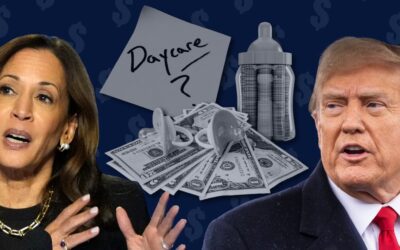
Vice President Kamala Harris intends to support small business owners and entrepreneurs by reducing their expenses and increasing their access to capital. Trump’s tariff proposal, however, could cause small businesses’ costs to rise. (Graphic by Francesca Daly)
Vice President Kamala Harris intends to support small business owners and entrepreneurs by reducing their expenses and increasing their access to capital. Trump’s tariff proposal, however, could cause small businesses’ costs to rise.
Democratic nominee Vice President Kamala Harris released several new economic policies last month aimed at supporting entrepreneurs and small business owners by reducing their expenses and increasing their access to capital.
The average small business owner puts $40,000 into starting their business — a significant sum that poses barriers to many aspiring small business owners.
If elected, Harris said she wants to expand a tax deduction for costs that are incurred while starting a business from $5,000 to $50,000 in an effort to ease the financial burden on small business owners and incentivize more entrepreneurs to start businesses.
“As President, one of my highest priorities will be to strengthen America’s small businesses,” Harris said at an event in New Hampshire in September. “So, first we’re gonna help more small businesses and innovators get off the ground.”
Harris also plans to make it easier for small business owners to file their taxes by working to implement a standard deduction in the tax code that can save the smallest businesses time and money by simplifying the filing process.
She additionally announced that she plans to direct her administration to launch an initiative aimed at modernizing outdated regulations that make it more difficult for small businesses and entrepreneurs to apply and receive federal funding. She said that her administration will encourage state and local governments to do the same.
Finally, the vice president has proposed the creation of a new fund that would allow the country’s smallest banks to cover the interest accrued on loans to new businesses.
These plans would need congressional approval, meaning if Republicans retain their House majority or win back control of the Senate, they could block these efforts.
What would Trump do?
Trump has not proposed any specific plans to assist small businesses, however, some of his other proposals could ultimately hurt them.
Trump has proposed a 20% tariff on all imported goods and a 60% tariff on Chinese imports, which would effectively impose a tax on American households.
Trump has argued that these tariffs would raise several trillion dollars over the next 10 years, but such tariffs would reduce other revenues due to their economic effects, and Morgan Stanley economists estimate that the implementation of these tariffs would mean 70,000 fewer jobs created each month in the US.
Widespread tariffs would also almost certainly cause disruptions in supply chains, potentially creating chaos for businesses across the US that rely on imports.
When a good is brought into the United States by an importer, the importer pays the cost of the tariff to the US government. Importers then have three options: pay the tariff and suffer lower profits, raise prices for consumers to cover the cost of the tariff, or renegotiate contracts with their suppliers or switch to suppliers with lower prices.
The repercussions of these tariffs “would be felt by every firm that sells imported goods and by every firm that uses imported inputs to run its business” according to the Brookings Institution. Production would be depressed, employment would likely fall, and prices would rise.
Additionally, Project 2025, the far-right plan for a second Trump term, would end disaster assistance for small businesses, making it more difficult to recover from severe weather events such as hurricanes.
And during Trump’s time as president, he slashed federal support for small businesses, allowed about 200,000 American businesses to permanently close, and called for significant cuts to programs that support small business owners.
Notably, Trump also regularly stole from small businesses and other contractors throughout his business career by not paying his bills.

Trump’s economic plans would worsen inflation, experts say
Mainstream economists warn that Trump's plans to impose huge tariffs on imported goods, deport millions of migrant workers, and demand a voice in...

Harris wants to give working families a tax cut and raise taxes on corporations. Trump would do the opposite.
Kamala Harris has proposed increasing the corporate tax rate, expanding the child tax credit, and cutting taxes for more than 100 million working...

Harris wants to cap child care costs and expand the child tax credit. Trump’s solution? Tariffs.
Harris has proposed capping families’ child care costs to 7% of their income and offering families of newborns up to $6,000 in the first year of the...

Harris wants to lower grocery prices by taking on price gouging. Trump’s plan would increase prices.
Kamala Harris has said that she will call on Congress to pass a federal ban on price gouging and give the federal government more authority to...

Harris’ plans aim to make housing more affordable. Trump’s plans are less clear.
Harris has vowed to increase the available housing supply by three million homes and to provide lower-income first-time homebuyers with up to...




